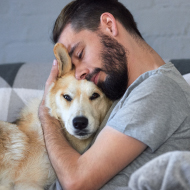
Projects exploring companion animal loss will be considered
A three-year funding programme to enable research into the human-animal bond has been announced by the Society for Companion Animal Studies (SCAS).
The programme will prioritise animal-assisted interventions (particularly with children), the human-companion animal relationship and cross-disciplinary working. Projects exploring companion animal loss and the bond-centred veterinary practice will also be taken into consideration, as will those that consider older people, children or people with diverse needs.
Dr Elizabeth Ormerod, SCAS chairman, explains: “Human-animal bonds are dynamic relationships between people and animals. They are usually symbiotic, providing psychological and physical benefits to both parties. Research projects, such as those we will be funding, are essential to add to the growing evidence base which can be key to encouraging such relationships, and also to supporting these if under challenge.”
The funding will consist of five x £10k maximum pump priming research awards, 2 x £1.5k undergraduate student project awards and a £1.5k maximum award to support open access publication.
Applications are now open and close on 31 March 2020. Visit www.scas.org.uk for further details and information on how to apply.



 The Veterinary Medicines Directorate (VMD) is inviting applications from veterinary students to attend a one-week extramural studies (EMS) placement in July 2026.
The Veterinary Medicines Directorate (VMD) is inviting applications from veterinary students to attend a one-week extramural studies (EMS) placement in July 2026.